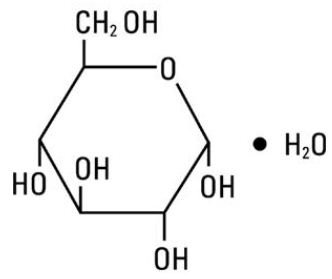Dextrose 50% Injection
Generic name: dextrose monohydrate
Dosage form: injection, solution
Drug class:Glucose elevating agents
Medically reviewed by Drugs.com. Last updated on Sep 1, 2021.
On This Page
NOTE: This solution is hypertonic - See WARNINGS and PRECAUTIONS.
LifeShield® Abboject® Syringe Fliptop Container
Ansyr™ II Plastic Syringe
Rx only
Descprition
50% Dextrose Injection, USP is a sterile, nonpyrogenic, hypertonic solution of dextrose in water for injection for intravenous injection as a fluid and nutrient replenisher.
Each mL of fluid contains 0.5 g dextrose, hydrous which delivers 3.4 kcal/gram. The solution has an osmolarity of 2.53 mOsmol/mL (calc.), a pH of 4.2 (3.2 to 6.5) and may contain sodium hydroxide and/or hydrochloric acid for pH adjustment.
The solution contains no bacteriostat, antimicrobial agent or added buffer (except for pH adjustment) and is intended only for use as a single-dose injection. When smaller doses are required, the unused portion should be discarded with the entire unit.
Dextrose, USP is chemically designated C6H12O6 ∙ H2O (D-glucose monohydrate), a hexose sugar freely soluble in water.
Dextrose, hydrous has the following structural formula:

Water for Injection, USP is chemically designated H2O.
The syringe is molded from a specially formulated polypropylene. Water permeates from inside the container at an extremely slow rate which will have an insignificant effect on solution concentration over the expected shelf life. Solutions in contact with the plastic container may leach out certain chemical components from the plastic in very small amounts; however, biological testing was supportive of the safety of the syringe material.
Clinical Pharmacolgy
When administered intravenously this solution restores blood glucose levels in hypoglycemia and provides a source of carbohydrate calories.
Carbohydrate in the form of dextrose may aid in minimizing liver glycogen depletion and exerts a protein-sparing action. Dextrose injection undergoes oxidation to carbon dioxide and water.
Water is an essential constituent of all body tissues and accounts for approximately 70% of total body weight. Average normal adult requirement ranges from two to three liters (1.0 to 1.5 liters each for insensible water loss by perspiration and urine production).
Water b..



